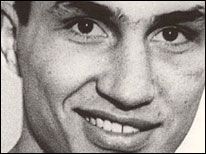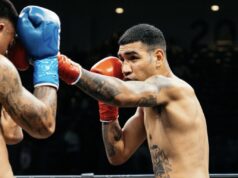
Heavyweights, a division in exile if not endangered, are making a lot of Euros, but American ambivalence at what was a piece of Americana frustrates Wladimir Klitschko trainer Emanuel Steward in a way he could have never imagined when he was an amateur growing up in Detroit, Joe Louis’ hometown.
Frustration said it all in a conference call.
Steward said it once, again and often — first at the criticism he hears about Klitschko’s opponent, former cruiserweight champion Jean-Marc Mormeck, Saturday in Dusseldorf in the third round of an Epix-televised trilogy (4:30 p.m. EST/1:30 p.m. PST) and again when asked whether there are any worthy challengers at all in a division that draws crowds in Germany and yawns in the United States.
“It’s so frustrating, these comments we’re reading,’’ said Steward, who says Klitschko (56-3, 49 KOs) will be confronted by a style he has yet to see in a smaller body that could make the 39-year-old Mormeck (36-4, 22 KOs) an awkward target.
Steward expects Klitschko to solve the problem with the calculating skill of a chess player. But check-mate isn’t what fans expect. Only an early knockout will do.
“According to all the experts, if the fight goes over three or four rounds, it’s a terrible performance,’’ Steward said. “If Wladimir knocks him out in a minute, it’s what he was supposed to do. We’re going into a definitely no-win situation.’’
No-win is a byproduct of the dominance Wladimir and his older brother, Vitali, have exerted over the heavyweights in the longest family reign since the Hapsburgs ruled Austria. The Klitschkos have won it all. Between them, they possess every acronym attached to a championship belt, including Vitali’s victory in a WBC-title defense three weeks ago over Dereck Chisora in Munich.
Chisora slapped Vitali at the weigh-in, spit in Wladimir’s face before opening bell and brawled with David Haye after the bout. Chisora got a split decision, losing the fight and winning the outrage, within a couple of circus-like days that brought a lot of attention to the heavyweights, but not because of the Klitschkos. They were there, doing what they always do: Winning. Steward is right. They only become news if they lose, or at least face what is perceived to be a real threat.
It’s within that context that Steward’s frustration is understandable. It’s hard to know where the Klitschkos belong. How would they have done in the Muhammad Ali era of the late 1960s and ‘70s? There’s only an argument and perhaps one day a video game.
“Unfortunately, this is probably – maybe – the worst heavyweight time in history,’’ he said. “It’s frustrating for us sometimes, too.’’
That frustration isn’t new. Larry Holmes suffered through it, post-Ali. Steward recalled a time when Joe Louis dominated the division so thoroughly that he turned it into his bum-of-the-month club. Each barren stretch, however, was followed by a rebirth.
“I think that those heavyweights are coming up,’’ said Wladimir, who at 35 is confident history will repeat itself in time for a true measure of where he belongs. “Think about Mike Tyson. He was 20-years-old. Nobody would ever think that a 20-year-old – boy or man – would become the youngest heavyweight champion in history.
“It always has been like that in the past. And it’s going to be like that in the future.’’
Amid renewed signs of life in the dormant division, Steward and Wladimir talk as if that future will have to happen in the U.S. against an emerging American contender. But who, please, who? Wladimir mentioned Chris Arreola. But Arreola is already a Klitschko victim. He was overwhelmed by Vitali in a 2009 mismatch at Los Angeles’ Staples Center. A better possibility might be Seth Mitchell, a promising apprentice and a former Michigan State linebacker who has talked about fighting a Klitschko, perhaps in early 2013. Wladimir has talked about Mitchell a couple of times during the last few months. It’s as if he sees him as a ticket back to the American stage.
Steward is hopeful, yet cautious.
“He looks good,’’ he said of Mitchell. “He’s a fundamentally good fighter. He comes in and he throws punches. He doesn’t wait. He’d be a good challenger.’’
But here’s the caveat and perhaps the frustration:
“Too bad we don’t have a bunch of them,’’ Steward said.
With Wladimir and Vitali, there are only two, too few.
AZ might be Margarito’s next stop
Tucson and Phoenix are possibilities for Antonio Margarito’s first fight since his December loss to Miguel Cotto, who won a 10th-round stoppage in New York when the ringside physician ended the rematch because of blood and swelling around Margarito’s problematic right eye.
Margarito wants a tune-up in May that will put him in line for a shot at Julio Cesar Chavez Jr. Tijuana, his home, has been mentioned. But Top Rank and his company, Showdown, already are doing a co-promotion of a ShoBox-televised card on March 23 at Casino del Sol in Tucson. Margarito’s brother-in-law, super-flyweight Hanzel Martinez, is scheduled for the undercard against fellow-Mexican Alex Rangel.
Margarito accompanied Martinez to a news conference at Casino del Sol a couple of weeks ago. Despite all the controversy that surrounds him, he is comfortable in Arizona, where he fought three times early in his career.
When there were questions about whether New York would license him for the Cotto rematch because of his surgically-repaired eye, US Airways Center in Phoenix became an alternate site. The Arizona State Boxing & MMA Commission said it would have licensed Margarito. Sergio Diaz, Margarito’s manager, said he believes the fight would have gone to Phoenix if New York had said no to the license and Cotto had agreed to the move.









